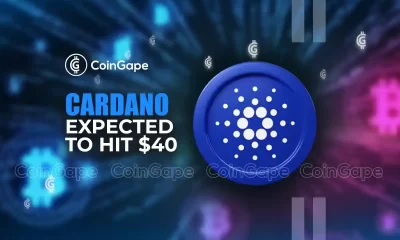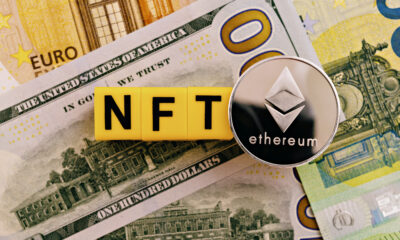Bitcoin
Biconomy’s ‘Delegated Authorization Network’ for AI Agents Relies on EigenLayer
Published
2 weeks agoon
By
admin
June 11: Biconomy, a Web3 infrastructure company, launched a new “Delegated Authorization Network,” or DAN, “enabling the safe delegation of on-chain activities to AI agents,” according to the team. A press release added: “Biconomy DAN operates by granting AI projects approved access to user’s ‘Delegated Auth’ keys stored on an EigenLayer AVS (Actively Validated Services), ensuring true autonomy without compromising on security. To integrate DAN into an AI agent, projects need to use key storage on DAN, an EigenLayer AVS, and program user-defined permissions for those keys using the DAN SDK. Biconomy has collaborated with Silence Labs for the development and launch of DAN.” A blog post is here.
:format(jpg)/cloudfront-us-east-1.images.arcpublishing.com/coindesk/N6GYM7MW4NEDJHCYSTHC2SLRAQ.png)
Ava Protocol Raises $10M for EigenLayer AVS for ‘Private Autonomous Transactions’
June 11: Ava Protocol, formerly OAK Network, secured $10 million in seed funding ($5.5 million initial and $4.5M seed+ rounds) to develop its Eigenlayer AVS for private autonomous transactions on Ethereum, according to the team: “Investors include Electric Capital, Taisu Ventures and Polygon founder Sandeep Nailwal. The funding supports core Web3 infrastructure, enabling cross-chain smart contract automation for applications like limit orders on decentralized exchanges. Over 10,000 wallets use its testnet with 1,000+ daily transactions. With 30+ partners, including Polkadot and Moonbeam, Ava aims to simplify Web3 application deployment.”
Covalent Says Arthur Hayes to Advise on Development of ‘Ethereum Wayback Machine’
June 11: Covalent, provider of a decentralized network for indexing blockchain data, announced that BitMEX founder Arthur Hayes has been named as a new strategic advisor. Hayes, who currently serves as chief investment officer of Maelstrom, “will be leading the development of the Ethereum Wayback Machine, ensuring that all Ethereum and EVM rollup data will shape AI with a preformat and verifiably secure pipeline,” according to the team. “This partnership will further secure Ethereum’s historical data preservation, ensuring accessibility and transparency to the ecosystem’s full history.”
Overlai, Blockchain Project for Image Verification, Launches Mobile App, Adobe Plugin on Aptos
June 11: Overlai, a blockchain project for image verification co-founded by photographers Paul Nicklen and Cristina Mittermeier, announced the beta launch of its mobile app and Adobe Plugin on Aptos. according to the team: “After validating a picture in Overlai – a process that can be completed in just a few clicks – creators can upload the asset to any digital medium and retain full ownership. No matter how much the photo is screenshotted, compressed, or converted, Overlai’s invisible watermark with a creator’s credentials, securely stored on the Aptos blockchain, stays intact – answering a pressing need amid the rise of generative AI.” (APT)
Vana, Network for User-Owned Data, Releases Satori Testnet
June 11: Vana, a network for user-owned data, released its Satori testnet. “Users can now mine and contribute to the network by exporting their data from platforms, leveraging data rights to sidestep big tech’s walled gardens. Proof-of-contribution ensures data quality by rewarding users proportionally to their data’s impact on AI model performance,” according to a blog post.
Flock.io, Ritual Form Partnership to Advance ‘Decentralized AI Composability’
June 11: FLock.io, a project to decentralize machine learning for AI models, and Ritual, which enables developers to access models on-chain via smart contracts, announced a strategic partnership to advance decentralized AI composability. According to the team: “Leveraging Ritual’s Infernet nodes, FLock.io aims to enhance transparency and verifiability in task routing, model usage and rewards distribution within the decentralized AI ecosystem. This collaboration underscores a commitment to fostering a fair and open-source environment where developers and contributors are compensated based on model usage.”
Core, EVM-Compatible L1 Aligned With Bitcoin, Launches Hackathon
June 11: Core, an Ethereum-compatible layer-1 blockchain project that relies on Bitcoin for its security setup, “is launching the BTCfi Summer Hackathon, a 12-week event designed to ignite innovation in the Bitcoin economy,” according to the team: “There are prizes for the top three positions ranging from a $5,000 – $15,000 grant, access to Defi workshops, social media highlights, a feature in the BTCfi ecosystem newsletter and more. The hackthon launched June 6 and the winners will be announced Aug. 19.”
Polygon Creates New Grants Program, 1B POL Unlocked Over 10 Years
June 11: Layer-2 network Polygon is starting a Community Grants Program to encourage builders to build in its ecosystem, Polygon Labs said on Tuesday. The program aims to place 1 billion POL, Polygon’s soon-to-rebrand MATIC token, into the hands of developers over the next 10 years. The program went live Tuesday with 35 million tokens, worth $23 million at current prices, eligible for distribution. The network is in the process of transitioning its current token, MATIC, to the new POL ticker, so this first tranche of tokens will be denominated in MATIC.
SubQuery Network, for Decentralized Indexers, Launches RPCs for Polkadot, Kusama
June 11: SubQuery Network, a distributed network of decentralized indexers and RPC providers, is launching the first decentralized RPCs for Polkadot and Kusama, according to the team: “The Polkadot RPCs that have been deployed for the Polkadot relay chain and Kusama are operated by more than 30 independent node operators.”
Optimism Finally Gets Its Mission-Critical ‘Fault Proofs’
June 11: Until now, the Ethereum layer-2 project Optimism has been missing a core feature at the heart of its security design: “Fault proofs.” On Monday, that long-promised tech finally came to Optimism’s mainnet. The Optimism team previously shared in March that it was testing its fault proofs system on their Sepolia testnet. Since then, they had an audit conducted by blockchain security firm Sherlock, and found a few bugs that they were able to patch out. “We literally deleted the entire system essentially, re-architected it, and rewrote the entire thing,” Karl Floersch, the CEO of OP Labs, said in an interview with CoinDesk.
Cardano Is on Track for Voltaire Upgrade This Month, Co-Founder Hoskinson Says
June 11: The Cardano network is set to move into the final phase of a multiyear program to become a wholly decentralized blockchain ecosystem later this month, co-founder Charles Hoskinson said in an X post Monday. As a first step, the validating node software operated by the system’s stake pool operators, or SPOs, needs to be upgraded to the latest version. Then, the blockchain will evolve into a backward-incompatible version, a process known as a hard fork, and in doing so, enter a new era known as Voltaire. Once the switch is complete, the seven-year-old blockchain will no longer be actively managed by Cardano development firm IOHK, instead wholly run by community members, according to a project roadmap. (ADA)
Lido Introduces ‘Restaking Vaults’ in Collaboration with Symbiotic, Mellow Finance
June 11: A new initiative from Lido DAO will see Lido’s partnering with Mellow Finance, a platform that lets users generate yield by depositing into restaking “vaults,” and Symbiotic, a permissionless restaking protocol. Mellow curators Steakhouse, P2P Validator, Re7 Labs and MEV Capital are each introducing vaults that accept stETH in tandem with Tuesday’s announcement. (LDO)
Protocol Village is a regular feature of The Protocol, our weekly newsletter exploring the tech behind crypto, one block at a time. Sign up here to get it in your inbox every Wednesday. Project teams can submit updates here. For previous versions of Protocol Village, please go here. Also please check out our weekly The Protocol podcast.
June 10: Wormhole, the blockchain interoperability protocol, will allow holders of its W token to stake with the Tally Governance Portal, “allowing the opportunity to participate in governance and influence the future direction of the Wormhole DAO and platform,” according to the team.” The update marks “a significant step toward decentralizing Wormhole through MultiGov, an industry-first multichain governance system for DAOs on Solana, Ethereum mainnet, and EVM L2s,” Wormhole said in a statement. “The Wormhole DAO will be the first to adopt MultiGov, enabling W holders to create, vote on, and execute governance proposals on any supported chain.”
Squads Labs Raises $10M Series A, Unveils Smart Wallet for Public Testing on iOS
June 10: Technology company Squads Labs, which aims to help businesses transact in and manage digital assets, raised $10 million in Series A funding led by Electric Capital. The funding round included participation from RockawayX, Coinbase Ventures, L1 Digital and Placeholder, Squads Labs said in an email on Monday. Squads has also unveiled a smart wallet aimed at individuals for public testing on iOS.
Edited by Sam Kessler and Bradley Keoun.
Source link
You may like


Anonymous Donor Pays $500,000 in Bitcoin for Julian Assange's Freedom Flight


BTC Hashrate decline spurs interest in altcoins: APORK, RNDR, APT emerge


Cardano Price Expected To Hit $40 Next Per Crypto Analysts


Web3 Game Con: The World’s Largest Web3 Game Show Debuts at ABS2024 in Taipei


German Government Moves Millions in Bitcoin to Exchanges


Notcoin surges 10% amid token burn and $4.2m incentive plan
Australia
Anonymous Donor Pays $500,000 in Bitcoin for Julian Assange's Freedom Flight
Published
13 mins agoon
June 26, 2024By
admin

An anonymous Bitcoin donor has paid over $500,000 in BTC to cover WikiLeaks founder Julian Assange’s expenses for his flight home to Australia. Assange is now a free man after pleading guilty in a US court under a deal ending his 14-year legal battle.
JUST IN: #Bitcoin pioneer and freedom fighter Julian Assange has landed in Australia. He is officially a free man!
A win for free speech and freedom 👏 pic.twitter.com/lDyPabqa8u
— Bitcoin Magazine (@BitcoinMagazine) June 26, 2024
Assange was released from prison in the UK on June 24th and flew to the US territory of Saipan to enter his plea. He had been fighting extradition to the US on espionage charges related to WikiLeaks publication of classified documents.
On June 26th, Assange arrived back in his native Australia and embraced family members in Canberra. He has been a pioneer for Bitcoin and WikiLeaks since its inception, even receiving donations in BTC in 2010 when few knew about it.
Just a day earlier, to cover the $520,000 cost of his private charter flight arranged by the Australian government, Assange’s wife issued an urgent appeal for donations. She also provided a Bitcoin address for contributions.
Remarkably, a single Bitcoin donor sent over 8 BTC worth nearly $500,000 to the address to cover the entire debt. This allowed Assange to return home without financial burden.
The anonymous donor’s massive contribution highlights the Bitcoin community’s enduring support for Assange and his work revealing government secrets. Bitcoiners have long advocated for his release.
While the whale’s identity remains unknown, the donation underscores Bitcoin’s role in enabling uncensored free speech and financial freedom.
The weeks ahead will focus on helping Assange recuperate after prolonged confinement. However, given his longstanding history with the technology, his engagement with Bitcoin will likely continue. Assange’s saga symbolized the battle between individual liberties and unchecked government power.
Source link
Bitcoin
German Government Moves Millions in Bitcoin to Exchanges
Published
4 hours agoon
June 26, 2024By
admin

The German government has transferred millions in seized Bitcoin to major Bitcoin and crypto exchanges Kraken and Coinbase, according to blockchain analysis firm Arkham.
The transfers originated from a wallet connected to the German Federal Criminal Police Office (BKA). In 2013, the BKA seized almost 50,000 Bitcoin, from a film piracy website.
On Tuesday, the BKA wallet moved $24 million in Bitcoin across two transactions to Kraken and Coinbase. An additional $30 million in Bitcoin was sent to an unknown wallet not affiliated with an exchange.
Arkham data shows that these transfers follow previous movements of $195 million in Bitcoin to exchanges on June 19 and 20. Over $425 million has been shifted in the past week.
While the German government still holds the majority of the seized Bitcoin, the transfers to exchanges may signal an intent to liquidate some of the assets.
Selling government-held Bitcoin introduces potential downward price pressure. However, the amounts moved so far represent a relatively small portion of daily Bitcoin trading volume.
Nonetheless, Bitcoin dipped below $60,000 on Tuesday amid this news. The German government’s Bitcoin wallet still holds over 46,000 Bitcoin worth nearly $3 billion.
For German police, the Bitcoin seized from illegal activities has dramatically increased in value. Selling even a fraction provides an unexpected windfall. However, concerns about potential impacts on the broader Bitcoin market remain.
Source link
24/7 Cryptocurrency News
Robert Kiyosaki Decodes Bitcoin’s “Banana Zone”, Contrasts with Fiat Currency
Published
6 hours agoon
June 26, 2024By
admin
Robert Kiyosaki, renowned financial educator and author of the influential book “Rich Dad Poor Dad,” has recently shared his insights on Bitcoin’s “Banana Zone,” a term popularized by financial expert Raoul Pal. He contrasts this with the inherent weaknesses of fiat currency, shedding light on why Bitcoin’s rules-based monetary system offers a more secure and prosperous future. Through his unique perspective, Kiyosaki continues to educate and guide investors on navigating the evolving financial landscape.
Robert Kiyosaki’s Perspective: Bitcoin’s “Banana Zone” vs. Fiat Currency
Robert Kiyosaki, emphasizes the fundamental differences between Bitcoin and fiat currency, highlighting Bitcoin’s superiority as a store of value. Kiyosaki describes fiat money as “debt-based,” subject to inflation and financial instability due to governments’ ability to print it at will.
In contrast, Bitcoin’s “rules-based” system, with its fixed supply and decentralized nature, makes it a more reliable store of value, designed to appreciate over time. Kiyosaki’s endorsement is bolstered by Raoul Pal, a former Goldman Sachs executive, who predicted Bitcoin’s entry into “the Banana Zone” a phase of parabolic price increase where those who missed out regret not investing earlier.
Pal’s advice led Kiyosaki to invest in Bitcoin at $6,000, with current values around $60,000, showcasing significant growth. This success story underscores Pal’s market predictions and Bitcoin’s long-term potential. As Bitcoin approaches the “Banana Zone,” Kiyosaki advocates understanding its investment benefits over fiat currencies, which may decline in value.
Also Read: US Spot Bitcoin ETFs Record Net Inflows, Has Bitcoin Price Really Bottomed?
Current Bitcoin Market Dynamics
Bitcoin’s price trajectory has illustrated a notable uptick of 0.78% over the past day, with the token trading at $61,639.67 at press time. Its 24-hour lows and highs were $60,626.97 and $62,466.32, respectively. Intriguingly, after a sluggish period of trading in recent days, primarily because of macroeconomic factors and ETF outflows, Bitcoin gains momentum on the backdrop of $31 million inflows in BTC ETFs on June 25, per data by Farside.
This renewed investor interest highlights the resilience and potential of Bitcoin as an asset. Meanwhile, Bitcoin’s dominance in the cryptocurrency market rested at 53.42%, up 0.10% from the previous day, indicating a steady consolidation of its market position. This dominance and price increase signify growing confidence in Bitcoin’s role as a leading digital asset, reinforcing the arguments made by financial experts like Kiyosaki and Pal.
Also Read: VanEck Declares Zero Fee for Spot Ethereum ETF Gearing Up for July 2 Launch
CoinGape comprises an experienced team of native content writers and editors working round the clock to cover news globally and present news as a fact rather than an opinion. CoinGape writers and reporters contributed to this article.
The presented content may include the personal opinion of the author and is subject to market condition. Do your market research before investing in cryptocurrencies. The author or the publication does not hold any responsibility for your personal financial loss.
Source link

Anonymous Donor Pays $500,000 in Bitcoin for Julian Assange's Freedom Flight

BTC Hashrate decline spurs interest in altcoins: APORK, RNDR, APT emerge

Cardano Price Expected To Hit $40 Next Per Crypto Analysts

Web3 Game Con: The World’s Largest Web3 Game Show Debuts at ABS2024 in Taipei

German Government Moves Millions in Bitcoin to Exchanges

Notcoin surges 10% amid token burn and $4.2m incentive plan

Robert Kiyosaki Decodes Bitcoin’s “Banana Zone”, Contrasts with Fiat Currency

Ron Wyden on FISA Reform and Crypto

Latin America's Largest Fintech Bank Integrates Bitcoin Lightning Payments Via Lightspark

bitter pills in crypto mass adoption?

Solana and Cardano Lead Top 10 Crypto Rebound

This Historical Ethereum Top Signal Is Yet To Appear This Cycle

Bitcoin's Trump Card: Dividing Is The Wrong Move

Florida lawmaker pitches ‘Bitcoin for Taxes’ bill

SEC Chair Says Approval Is Going Smoothly

Bitcoin Dropped Below 2017 All-Time-High but Could Sellers be Getting Exhausted? – Blockchain News, Opinion, TV and Jobs

What does the Coinbase Premium Gap Tell us about Investor Activity? – Blockchain News, Opinion, TV and Jobs
BNM DAO Token Airdrop

NFT Sector Keeps Developing – Number of Unique Ethereum NFT Traders Surged 276% in 2022 – Blockchain News, Opinion, TV and Jobs
New Minting Services
A String of 200 ‘Sleeping Bitcoins’ From 2010 Worth $4.27 Million Moved on Friday

Block News Media Live Stream

SEC’s Chairman Gensler Takes Aggressive Stance on Tokens – Blockchain News, Opinion, TV and Jobs

Friends or Enemies? – Blockchain News, Opinion, TV and Jobs

Enjoy frictionless crypto purchases with Apple Pay and Google Pay | by Jim | @blockchain | Jun, 2022

Block News Media Live Stream

How Web3 can prevent Hollywood strikes

Block News Media Live Stream

XRP Explodes With 1,300% Surge In Trading Volume As crypto Exchanges Jump On Board

Block News Media Live Stream
Trending

 Altcoins2 years ago
Altcoins2 years agoBitcoin Dropped Below 2017 All-Time-High but Could Sellers be Getting Exhausted? – Blockchain News, Opinion, TV and Jobs

 Binance2 years ago
Binance2 years agoWhat does the Coinbase Premium Gap Tell us about Investor Activity? – Blockchain News, Opinion, TV and Jobs
- Uncategorized2 years ago
BNM DAO Token Airdrop

 BTC1 year ago
BTC1 year agoNFT Sector Keeps Developing – Number of Unique Ethereum NFT Traders Surged 276% in 2022 – Blockchain News, Opinion, TV and Jobs
- Uncategorized3 years ago
New Minting Services

 Bitcoin miners2 years ago
Bitcoin miners2 years agoA String of 200 ‘Sleeping Bitcoins’ From 2010 Worth $4.27 Million Moved on Friday

 Video2 years ago
Video2 years agoBlock News Media Live Stream

 Bitcoin1 year ago
Bitcoin1 year agoSEC’s Chairman Gensler Takes Aggressive Stance on Tokens – Blockchain News, Opinion, TV and Jobs


✓ Share: